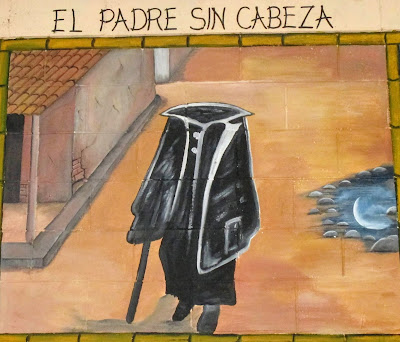The War After the War
No one comes to visit. The road is controlled by the muchachos. It's not really a road - more of a dirt path, but it is controlled. We come in through another way.
The home is built in the traditional style of the countryside - small, with a big porch area between the sleeping rooms and the kitchen. The kitchen is tucked inside a couple of sheets of corrugated metal. There are plants all around. We sit in plastic chairs on the cement veranda, appreciative of the breeze on the hot, moist afternoon. It is little slice of paradise. The muchachos hang out behind the row of plants. It is a paradise and a prison.
The father tells the story of this place - a farming cooperative which was formed after the civil war, one parcel shared by 80 families. As in many post-war settlement communities, the people here have never obtained title to their land. The cooperative has been take to court twice, by people claiming "ownership," and both times that ownership was deemed false.
The presence of the muchachos has made the last two years difficult. One third of the families have left. There are few, maybe no teens or young adults living on the cooperative. A daughter has received death threats. The family cannot farm the land because they cannot cross an invisible boundary which separates their home from their fields. The mother cannot sell tortillas because no one can come to buy them, nor can she leave to sell them. The family lives off of the food they can grow next to the house.
The girls go to school far away where it is safer. One travels 2-3 hours by bus each way. They say they are lonely, but they can keep going because "no matter what, God is with them."
The father reflects, "We are living the war after the war."
They give us paper flowers, fresh coconut water and little cakes. The skies open up and the music of heavy rain pounding on the metal roof accompanies our little party on the veranda. The chickens squawk loud enough to be heard over the rain. They are angry to be put out and drenched because strangers have taken over their porch.
We laugh, we cry a little, we hug, we take photos. No one but us will see the photos. It is safer that way.
The home is built in the traditional style of the countryside - small, with a big porch area between the sleeping rooms and the kitchen. The kitchen is tucked inside a couple of sheets of corrugated metal. There are plants all around. We sit in plastic chairs on the cement veranda, appreciative of the breeze on the hot, moist afternoon. It is little slice of paradise. The muchachos hang out behind the row of plants. It is a paradise and a prison.
The father tells the story of this place - a farming cooperative which was formed after the civil war, one parcel shared by 80 families. As in many post-war settlement communities, the people here have never obtained title to their land. The cooperative has been take to court twice, by people claiming "ownership," and both times that ownership was deemed false.
The presence of the muchachos has made the last two years difficult. One third of the families have left. There are few, maybe no teens or young adults living on the cooperative. A daughter has received death threats. The family cannot farm the land because they cannot cross an invisible boundary which separates their home from their fields. The mother cannot sell tortillas because no one can come to buy them, nor can she leave to sell them. The family lives off of the food they can grow next to the house.
The girls go to school far away where it is safer. One travels 2-3 hours by bus each way. They say they are lonely, but they can keep going because "no matter what, God is with them."
The father reflects, "We are living the war after the war."
They give us paper flowers, fresh coconut water and little cakes. The skies open up and the music of heavy rain pounding on the metal roof accompanies our little party on the veranda. The chickens squawk loud enough to be heard over the rain. They are angry to be put out and drenched because strangers have taken over their porch.
We laugh, we cry a little, we hug, we take photos. No one but us will see the photos. It is safer that way.



Comments
Post a Comment